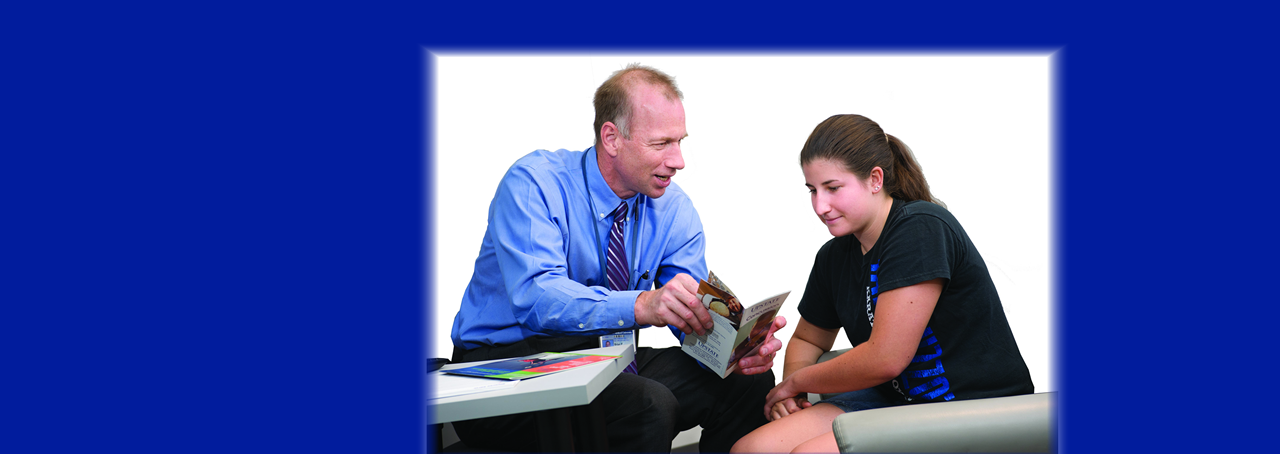TAF investment will be used to advance a new concussion assessment tool
Contrary to popular belief, a concussion doesn’t usually cause visible bruising or swelling in the brain. In fact, most concussions represent mild traumas that are both subtle and difficult to detect.
To help doctors and clinicians properly diagnose and manage concussions, Dr. Christopher Neville, associate professor of CHP-Physical Therapy, and Dr. Brian Rieger, director of the Upstate Concussion Center, are trying to develop a suite of cognitive tests that are more sensitive to the complexities of concussions and will serve as valuable metrics to assess concussion injuries.
The new set of cognitive tests will target memory and divided attention tasks, known to be impaired with concussion injuries, while providing objective measures of assessment related to these impairments. It will likely be incorporated into a more comprehensive assessment platform once complete.
The project got its start three years ago when Rich Uhlig, CEO of Motion Intelligence—a START-UP NY company—contacted SUNY Upstate, who put him in touch with Rieger. Motion Intelligence wanted to develop an assessment system for concussion patients, and Uhlig was interested in finding a partner. Rieger had already been collaborating on concussion assessment research with Neville, who specializes in movement dysfunctions.
It was a natural step for the SUNY scientists to share their combined expertise with Motion Intelligence to develop ClearEdge, a tablet-based suite of balance and cognitive tests. With the initial development of ClearEdge nearing completion, Drs. Rieger and Neville have now turned their attention on potential improvements that could be incorporated in future versions of the product.
Research indicates that the frontal lobes, as well as the brain stem and projections from the brain stem up into the frontal regions, are very vulnerable to injury during concussion. These are also areas that are important for attention, manipulating information, and multitasking. Rieger and Neville reasoned that testing the patient’s ability to multitask might yield the most accurate index of the extent of impairment caused by a patient’s concussion.
Their reasoning reflects the science behind concussions. The post-concussion brain almost always looks normal on a CT scan. In reality, its neurochemistry has been disrupted in a way that prevents the brain cells from functioning. Explains Dr. Rieger, “Different chemicals literally get knocked out of the brain cells. The brain goes into action to restore its normal neurochemistry, but that takes a lot of energy.” The resulting “energy crisis” in the brain produces an inability to perform higher-level brain functions like multitasking.
Traditional tests for assessing concussions typically focus on processing speed, attention and memory, all of which can be affected by injury. The new suite of cognitive tests developed by Neville and Rieger is intended to be more challenging, but realistic to the types of mental challenges we are faced with every day—for example, talking on the phone while grocery shopping for a list of items you have to remember.
This kind of multitasking requires greater mental flexibility and a higher degree of processing, skills that are often impaired in a person who has suffered a concussion. By measuring these skills, the tests can better measure the degree of impairment. Says Neville, “Historically, cognitive tests just weren’t as sensitive as clinicians would prefer. If you had a subtle impairment, there’s a chance it wouldn’t show up,”
What’s more, the traditional tests could be “fooled” by injured athletes or military personnel eager to return to the field, who would either memorize the questions through repeated re-testing or force themselves to concentrate for a limited period of time. Neville and Rieger are working on a testing protocol that is both longer and more taxing, making it far more difficult for a patient to mask their injury through a burst of effort. And, as the test is administered on a tablet, the underlying software will allow for multiple versions of the test, precluding memorization.
Rieger and Neville have received a $40,000 investment from the SUNY Technology Accelerator Fund (TAF) to develop the suite of tests and determine its reliability and sensitivity. They’re currently collecting data to ensure that they’ve sampled the areas of cognitive functioning that are in fact affected by concussion.
First, they will assess the performances of individuals without concussion injuries; then, they’ll assess individuals who’ve had a concussion. Says Rieger, “We don’t just want to come up with a test and throw it out there and say, ‘This is a great idea.’ We really want to study the test to see if it’s doing what we expect it to do.”
Rieger stresses that the new suite of tests is both innovative and incremental. It builds on what’s already been done to focus on translating the research about concussion into better assessment. Rieger serves on the concussion team for the New York State Public High School Athletic Association, educating schools, coaches, and athletic directors and works with the Brain Injury Association.
He and Neville are eager to continue their research collaboration. Their greatest reward is ensuring that patients don’t risk further damage by returning to normal activities too quickly—before the mild trauma of a single concussion can turn into something much, much worse.
comments powered by Disqus


